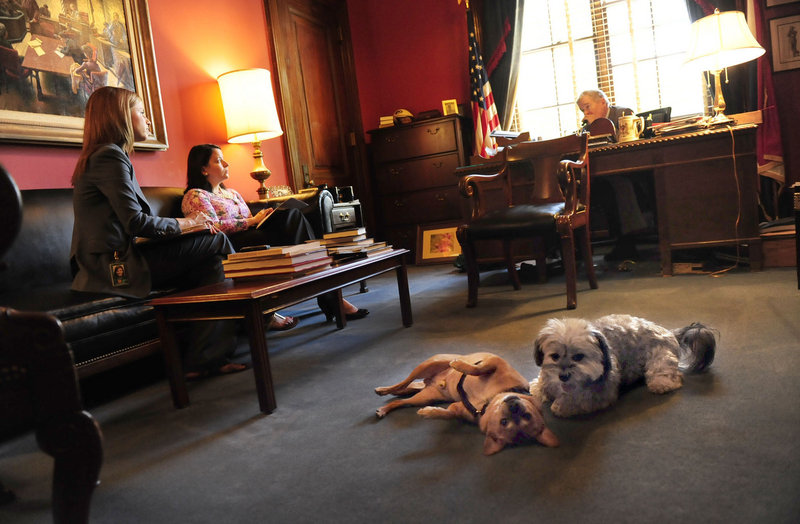WASHINGTON – They are the ultimate Capitol Hill insiders, privy to high-powered meetings between lawmakers and lobbyists, able to just saunter into congressional offices — no appointment necessary. Want this kind of access? Ruff.
We’re talking about dogs. A couple of dozen roam the halls of power in the Capitol every day.
“Treat time! Treat time!” booms Sen. Christopher “Kit” Bond, R-Mo., from behind his desk. As vice chairman of the Senate Intelligence Committee, Bond was about to go on television to talk about terrorism, but first it was Tiger time. Now you might think an expert on national security would have a noble German shepherd or a muscular Doberman, and Bond is sure to mention that he grew up with Labrador retrievers, hunting dogs and beagles. But Tiger is a 2-year-old Havanese, a cuddly toy breed that looks like a gray baby Wookiee.
“This is the first time I’ve had a fufu dog,” he says. And his colleagues don’t let him forget it: When Tiger was a puppy and weighed only five pounds, Bond took her outside with a pink leash and collar and someone said, “Didn’t you used to be Kit Bond?”
It was noon and Tiger had her eyes locked on Bond’s container of yellow dog treats. Next to Tiger sat Pooley, a Chihuahua mix who belongs to Shana Marchio, Bond’s communications director. “I think they can tell time, because they always know when it’s treat time,” the senator confides.
Tiger is named after the University of Missouri mascot. She likes to lie on her bed under Bond’s desk and destroy University of Kansas Jayhawks toys. Tiger’s school spirit once led to an embarrassing situation, Bond says: She wouldn’t stop barking at Federal Deposit Insurance Corp. Chairman Sheila C. Bair. Bair has two degrees from Kansas, and “I think she sniffed it out,” Bond said.
Many congressional dogs have names relevant to their home states. Rep. Ed Whitfield, R-Ky., rescued a Labrador mix from the side of Interstate 64 in West Virginia and named her Julep after his state’s signature cocktail.
Rep. Ken Calvert, R-Calif., owns a dachshund named Cali, for California, and Rep. Jerry Lewis, R-Calif., has a bichon fris?oodle mix named Bruin, after the UCLA mascot.
While Bruin makes the weekly trip from D.C. to California with Lewis, Cali lives in D.C. with his owner. A couple of years ago — pre-Cali — Calvert decided that his schedule was too hectic for him to own a dog. His communications director, Rebecca Rudman, offered to take care of the dog if she could bring the dog to work every day. Rudman and Calvert picked out Cali on a Sunday, and she came to work Monday morning. Visitors can see faint outlines of Cali’s messes on the carpet before she was housebroken — or, House broken, in this case.
Cali has made herself at home on the Hill, swimming in the fountain outside the Rayburn House Office Building, snagging a treat from the Capitol Police every morning on her way in and playing with her best friend, the Chihuahua in the Committee on Oversight and Government Reform office.
Congress has a long history of lawmakers bringing their dogs to work, says Senate historian Donald Ritchie. In the 19th century, John Randolph of Virginia often strode into the Senate chamber with his hunting hounds at his heels.
The late Sen. Edward M. Kennedy, D-Mass., was known for walking his Portuguese water dogs, Sunny and Splash, in the grassy area next to the Russell Senate Office Building. “It was as much exercise for Senator Kennedy as it was for the dogs,” Ritchie said. “Usually aides walk the dogs, but Kennedy always did it himself.”
Ritchie doesn’t know of any rules on the books concerning dogs: “Senators can pretty much do what they want.”
In addition to Julep, Whitfield also owns a Scottish terrier named Bosley and the rambunctious Jack Russell terrier (is there any other kind?) Nigel. Nigel has to come to work with the congressman every day “because our dog walker can’t really deal with him,” Whitfield says.
Whitfield’s wife, Connie Harriman-Whitfield, is the Humane Society’s senior adviser for presidential initiatives, and she helped organize a dog contest last year called the Congressional Canine Honors.
Two of the six awards in the photo contest went to Whitfield’s staffers’ dogs — including “rising political star” and “elder statesdog” — causing whispers that Whitfield’s Humane Society connections gave him an unfair advantage. (“Not true,” he says.)
But it was Bosley who caused the most trouble back in 2002 when he escaped from the Cannon House Office Building and took off running down Independence Avenue SE. Whitfield’s staff and a policeman chased him all the way to the Capitol.
The benefits of having Julep, Nigel and Bosley underfoot outweigh their rare disruptions, Whitfield said: “I think the atmosphere is better because it’s hard to be very formal when you have a dog jumping around the office.”
Send questions/comments to the editors.



Success. Please wait for the page to reload. If the page does not reload within 5 seconds, please refresh the page.
Enter your email and password to access comments.
Hi, to comment on stories you must . This profile is in addition to your subscription and website login.
Already have a commenting profile? .
Invalid username/password.
Please check your email to confirm and complete your registration.
Only subscribers are eligible to post comments. Please subscribe or login first for digital access. Here’s why.
Use the form below to reset your password. When you've submitted your account email, we will send an email with a reset code.